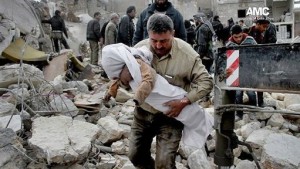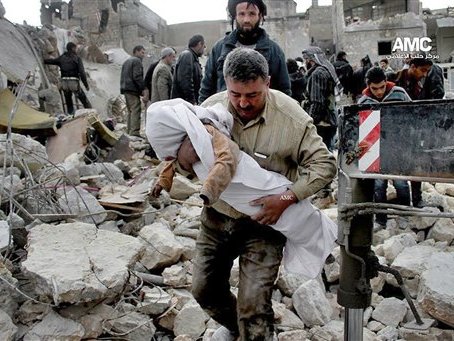
BEIRUT (AP) — Fighting in Syria killed nearly 1,900 people, including at least 430 civilians, during the week of U.N.-hosted peace talks in Switzerland, activists said Friday. The death toll indicates that violence barely paused as the warring parties met but struck uncompromising stances, failing to reach any agreements that could help resolve the conflict.
The figures were reported by the Britain-based Syrian Observatory for Human Rights. Its director, Rami Abdurrahman, said the week’s bloody toll was about average at this point in the three-year conflict.
The number included at least 430 civilians, killed by bombs, snipers, missiles, and other causes. The rest were rebels and forces loyal to President Bashar Assad. The Observatory obtains its information from activists on the ground, and also keeps a running total.
The conference didn’t produce any tangible results, although connections made in Switzerland are likely to develop into prolonged negotiations to try to resolve the war.
The conflict began as largely peaceful protests against Assad in March 2011, but the uprising since became an increasingly sectarian civil war that has killed more than 130,000 people. It has forcibly displaced one-third of the entire prewar population of 23 million, including over 2 million who have flooded into neighboring countries. Tens of thousands more are blockaded in rebel-held areas, where Assad loyalists prevent food and aid from entering to break their resistance.
Among the most active of the rebel groups are hard-line Sunnis linked with al-Qaida, some of whom are blamed for atrocities targeting minorities.
The violence has also crossed over into Syria’s neighbor Lebanon. Shells fired by Syrian government tanks exploded in ravines and valleys of the mountainous northern province of Akkar, killing one Syrian living in Lebanon and wounding several others, a Lebanese security official said.
He said at least 50 tank shells hit in and around eight villages on the border.
Observatory director Abdurrahman said the shelling was likely a response to an attack by rebel gunmen on the Syrian villages of Bahlawaniyeh and Ghida, whose residents belong to the minority Alawite sect to which Assad belongs. He said rebels fired at the villages from inside Lebanese territory, killing five men.
The Lebanese security official, who spoke on condition of anonymity, said he was not aware of any rebel movements in Lebanese territory. He said the shelling came in the context of a pitched battle in Syria, near the border, where rebels were attacking soldiers in an area known as Zara.
It was impossible to immediately reconcile the conflicting reports.
Within Syria, government helicopters continued to unleash barrel bombs packed with explosives and fuel on rebel-held parts of the northern city of Aleppo. The crude bombs cannot strike targets with precision and cause massive damage upon impact.
On Thursday, at least 16 people were killed in Aleppo from similar strikes.
The Aleppo Media Center, another activist group, said five died in Friday’s strikes. Conflicting tolls are common in the wake of the strikes.
Syrian forces have used barrel bombs against rebel-held areas throughout the country but especially against Aleppo, the country’s largest city. Rebels seized parts of the city in July 2012, but in recent weeks, Syrian troops have made gains, taking advantage of rebel infighting and the devastating impact of the barrel bombs.


